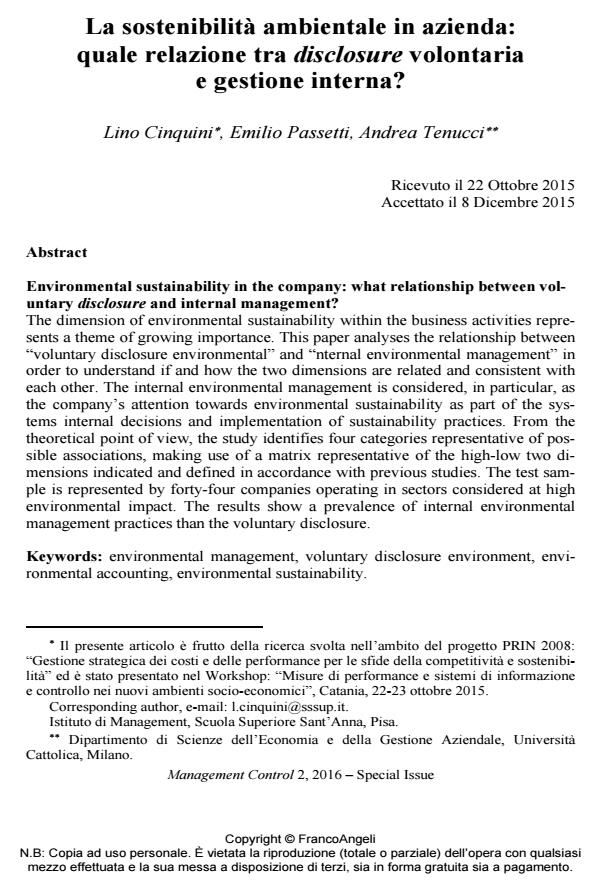La sostenibilità ambientale in azienda: quale relazione tra disclosure volontaria e gestione interna?
Titolo Rivista MANAGEMENT CONTROL
Autori/Curatori Lino Cinquini, Emilio Passetti, Andrea Tenucci
Anno di pubblicazione 2016 Fascicolo 2016/2
Lingua Italiano Numero pagine 18 P. 15-32 Dimensione file 382 KB
DOI 10.3280/MACO2016-002002
Il DOI è il codice a barre della proprietà intellettuale: per saperne di più
clicca qui
Qui sotto puoi vedere in anteprima la prima pagina di questo articolo.
Se questo articolo ti interessa, lo puoi acquistare (e scaricare in formato pdf) seguendo le facili indicazioni per acquistare il download credit. Acquista Download Credits per scaricare questo Articolo in formato PDF

FrancoAngeli è membro della Publishers International Linking Association, Inc (PILA), associazione indipendente e non profit per facilitare (attraverso i servizi tecnologici implementati da CrossRef.org) l’accesso degli studiosi ai contenuti digitali nelle pubblicazioni professionali e scientifiche.
The dimension of environmental sustainability within the business activities represents a theme of growing importance. This paper analyses the relationship between "voluntary disclosure environmental" and "nternal environmental management" in order to understand if and how the two dimensions are related and consistent with each other. The internal environmental management is considered, in particular, as the company’s attention towards environmental sustainability as part of the systems internal decisions and implementation of sustainability practices. From the theoretical point of view, the study identifies four categories representative of possible associations, making use of a matrix representative of the high-low two dimensions indicated and defined in accordance with previous studies. The test sample is represented by forty-four companies operating in sectors considered at high environmental impact. The results show a prevalence of internal environmental management practices than the voluntary disclosure.
Parole chiave:Environmental management, voluntary disclosure environment, environmental accounting, environmental sustainability.
- The role of Eco-control in the implementation of Sustainable Business Models Giacomo Fabietti, Francesca Trovarelli, in MANAGEMENT CONTROL 3/2016 pp.141
DOI: 10.3280/MACO2016-003008 - Determinants of the implementation of environmental risk indicators: Empirical evidence from theItalian manufacturing context Rita Lamboglia, Francesco Paolone, Daniela Mancini, in Corporate Social Responsibility and Environmental Management /2019 pp.307
DOI: 10.1002/csr.1680 - Sistemi di controllo a supporto dello sviluppo sostenibile delle PMI del settore vitivinicolo: il caso D'Ambra vini s.r.l. Maria Pia Maraghini, Gianluca Vitale, in MANAGEMENT CONTROL 3/2018 pp.111
DOI: 10.3280/MACO2018-003006 - Percorsi di decarbonizzazione e sistemi di controllo: un modello di analisi per il settore energetico Enrico De Camillis, Teresa Izzo, Daniela Mancini, in MANAGEMENT CONTROL 2/2025 pp.179
DOI: 10.3280/MACO2025-002009 - Management Control Systems for Sustainability and Sustainability of Management Control Systems Nicola Castellano, Carsten Felden, in MANAGEMENT CONTROL 2/2021 pp.5
DOI: 10.3280/MACO2021-002001 - L'orientamento delle aziende ad uno sviluppo sostenibile: quale contributo da parte dei sistemi di management e controllo? Giuseppe D’Onza, in MANAGEMENT CONTROL 1/2022 pp.5
DOI: 10.3280/MACO2022-001001 - Greenwashing pp.107 (ISBN:978-1-80117-967-6)
- Performance economiche e ambientali nelle aziende italiane di igiene urbana: prime evidenze empiriche Francesca Bartolacci, Antonella Paolini, Anna Grazia Quaranta, Michela Soverchia, in MANAGEMENT CONTROL 2/2017 pp.33
DOI: 10.3280/MACO2017-002003 - Environmental, Social, Governance (ESG) Antonio Leotta, Carmela Rizza, Daniela Ruggeri, Mariastella Messina, pp.759 (ISBN:978-3-031-76617-6)
Lino Cinquini, Emilio Passetti, Andrea Tenucci, La sostenibilità ambientale in azienda: quale relazione tra disclosure volontaria e gestione interna? in "MANAGEMENT CONTROL" 2/2016, pp 15-32, DOI: 10.3280/MACO2016-002002